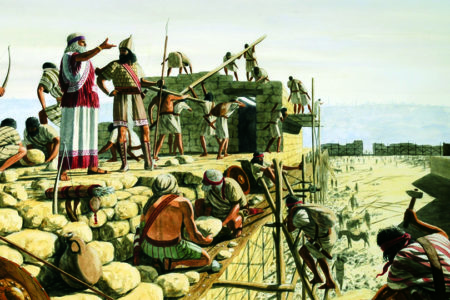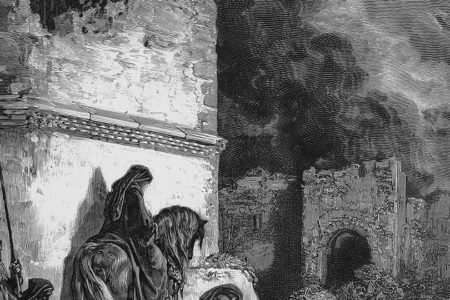Paul’s Personal Postscript Galatians 6:11–18
VANCE HAVNER once said, “Contending for the faith is not easy. It is not pleasant business. It has many perils. It is a thankless job, and it is highly unpopular in an age of moral fogs and spiritual twilights. It is nicer to be an appeaser than an opposer.”
The Apostle Paul was no appeaser. He was not trying to win any popularity contests. He was a soldier of the cross who opposed those who tried to subvert the doctrine of salvation by grace through faith, apart from any work of the law. He fought hard against those who tried to undermine Christian freedom in Christ. To those who doubted his true motive Paul could show the scars of sincerity—scars resulting from stoning, scourging, self-denial, and other struggles he faced defending the truth of the gospel.
In the closing verses of the Epistle to the Galatians, Paul personalized the abstract principles he had argued throughout his letter by comparing his motives with those of the Judaizers.
Paul’s Writing
The apostle often dictated his letters to an amanuensis (one employed to write from dictation or to copy manuscripts), but he wrote the salutations and conclusions in his own hand, proving that the letter was genuine. He made sure the Galatians realized that he was the author of this letter by stating, “Ye see how large a letter I have written unto you with mine own hand” (v. 11). Some interpret the words “how large a letter” to mean that Paul wrote in large letters because of bad eyesight (cp. 4:13–15). Others say he wrote in Greek uncials (large block letters) rather than the cursive style of a scribe. Still others believe that the apostle was referring to writing his conclusion in capital letters (the Greek text says “letters not “letter”) in order to emphasize the importance of his teachings throughout the epistle. The correct interpretation is debatable, but Paul’s motive is certain. In these latter verses he again reminded his readers of the letter’s authenticity and reviewed its major themes.
Paul’s Warning
Paul warned the Galatians of the Judaizers’ motive. They were not interested in the Galatians’ spiritual well-being but wanted “to make a fair show in the flesh” thus they “constrain you to be circumcised” (v. 12). They were interested only in making converts to their position in order to parade them before others and receive the praise of men. Often the true motive of churches or individuals who boast of the many people they have won to the Lord, baptized, or had join the church is dubious. It may not be to praise the Lord but to win the praise of men.
One reason the Judaizers practiced circumcision was to avoid “suffer[ing] persecution for the cross of Christ” (v. 12). They identified with the church but not with the cross. They were not ready to embrace the shame of the cross suffered by the followers of the one who had died on it, under the curse of the law. By embracing circumcision they hoped to sidestep the wrath of the Jewish leaders, who were severely persecuting the Christians while at the same time trying to win them to their own position.
The cross stood for rejection and shame in that day. It was the most inhumane, dehumanizing death possible. Its purpose was to humiliate and prolong the suffering of the one being crucified. The condemned person hung naked for all to see and suffered excruciating physical and mental pain, sometimes for days, before succumbing to death. Such punishment was ordered by Roman law against enemies of the state or those committing serious crimes against society. Because crucifixion was a severe form of capital punishment, Roman citizens were exempt from it.
One author has beautifully stated, “Yet this symbol of a horrible means of death became for Christians the most cherished symbol of life, because Christ had suffered and died on a cross as the full and final sacrifice to save them from sin and death. God transformed the most fearful expression of man’s hatred into the most beautiful expression of His divine love. Paul presented the cross often in this epistle (2:20; 3:1; 5:11, 24; 6:12, 14) because through it God provided His redemptive grace to mankind.”1
To the Jewish people, the preaching of the cross was “a stumbling block” and to the Gentiles it was “foolishness,” but to Christians “it is the power of God” unto salvation (1 Cor. 1:18–25). Jesus made it very clear: “If any man will come after me, let him deny himself, and take up his cross, and follow me” (Mt. 16:24); “And he that taketh not his cross and followeth after me, is not worthy of me” (Mt. 10:38).
Paul accused the Judaizers of hypocrisy. They masked their true motives by demanding that Gentiles be circumcised and keep the Mosaic Law, but they did not practice what they preached: “For neither they themselves who are circumcised keep the law” (v. 13).
They were much like the scribes and Pharisees mentioned by Jesus in Matthew 23, who demanded that their followers practice religious rituals that they themselves did not keep. Jesus called such people “fools” (v. 17), “hypocrites” (vv. 23, 25, 27, 29), “serpents,” and a “generation of vipers” (v. 33). Like the Pharisees, the Judaizers were practicing things through which they could “glory in [the] flesh” (v. 13).
Christians must guard against the same attitudes and practices. It is possible to be actively involved in the Lord’s work for the wrong motives-spiritual pride or self-praise.
Paul’s Walk
In contrast to the Judaizers, who gloried in human achievement, Paul “glor[ied] … in the cross of … Christ” (v. 14). He knew well of what he spoke, for in the past Paul had been a Pharisee, a religious zealot whose zeal for the law was unparalleled in Judaism. After coming to Christ, however, he counted it all as loss compared to the excellency of knowing Christ Jesus (Phil. 3:4–9). With a strong negative—“God forbid” (perish the thought) (v. 14)—he showed extreme disgust for glorying in anything other than the cross of Christ. But the apostle could glory in the cross, which is a symbol of the entire system of salvation and Christian belief.
Paul gave three reasons why he gloried in the cross. The first was his commitment: “the world is crucified unto me, and I unto the world” (v. 14b). The word world denotes everything that is outside of and opposed to the things of Christ. It refers to the spiritual and moral character of this age of grace. Since the fall of Adam and Eve, all ages have been in spiritual darkness, greatly affected by Satan, “the prince of the power of the air” (Eph. 2:2). Believers have been freed from this evil system through the cross of Christ. Paul said that he was dead to the world’s evil system; it had no control over him. His motives were Christ-centered, not world-centered. He wanted the Galatians to follow him and his doctrine, not the fleshly doctrine of the Judaizers.
Paul’s second reason for glorying in the cross was that believers are set free from the ceremonial law: “For in Christ Jesus neither circumcision availeth anything, nor uncircumcision, but a new creature [creation]” (v. 15). Practices such as circumcision for the Jews or uncircumcision for the Gentiles do not provide a means to salvation (cp. 5:6). Salvation and a radical change in character are obtainable only through the work of Christ on the cross. No one can become a new creature by keeping ceremonial laws.
Paul’s third reason for glorying in the cross was that it is the only way through which believers can order their conduct in a way that pleases the Lord: “And as many as walk [order their conduct] according to this rule, peace be on them, and mercy, and upon the Israel of God” (v. 16). His point was that the Galatians (especially the Judaizers among them) could choose how they would order their conduct regarding their acceptance of the grace of Christ through faith. The word rule (kanon) means a principle or standard of measurement. Believers are to order their conduct by the principles and standards of the gospel through the indwelling Holy Spirit, who empowers them to do so (cp. 5:16–17, 25). In so doing, they experience the “peace … and mercy” of God (v. 16). Conversely, those who refuse to walk according to this rule do not experience God’s peace and mercy.
Some believe that Paul’s reference to “the Israel of God” (v. 16) applies to all true believers-Jews and Gentiles-who make up the church. This cannot be the correct interpretation for a number of reasons. First, the phrase “and upon the Israel of God” is an afterthought to the general benediction and shows Paul’s desire for Jewish people who embrace the gospel of Christ to receive God’s peace and mercy, referring to the true remnant within Israel (cp. Rom. 9:6, 27; 11:5). In this passage Paul recognized the true Jewish believers within the church.2 Second, the word and can be translated even (NIV), identifying “the Israel of God” as Jewish believers within the church. Third, the other 65 uses of the term Israel in the New Testament refer to the Jewish people. It would be strange for Paul to refer to Gentile Christians as “Israel.” Fourth, Paul elsewhere referred to two kinds of Israelites—believers and unbelievers (Rom. 9:6).3 It is clear that the phrase “the Israel of God” refers only to Jewish believers within the church.
Paul’s Wounds
Paul, having fully dealt with the Judaizers’ legalism, had one final word to the Galatian church on the subject: “Henceforth let no man trouble me; for I bear in my body the marks of the Lord Jesus” (v. 17). He was not implying that he did not want to hear about problems or trouble the Galatian believers were facing. Nor was he asking the Judaizers to stop causing trouble for him. Rather, he was asking the Galatians to stop causing trouble for him by following the heretical practices and teachings of the Judaizers, for he bore in his body scars caused by his stand for the truth of the gospel of Christ as a committed servant of the Lord.
The word marks (Gr., stigmata) means brand and was often used in Paul’s day to denote ownership. Before his conversion Paul bore the mark of circumcision to identify himself as a Jew, but now he bore the marks of Christ, which identified him as a Jewish believer. The word was used in many different ways. Slaves in the Phrygian temples were branded with the name of their deity, showing that they were committed to serve that god for life. Likewise, Paul bore in his body the marks of service to his God (Col. 1:24). Soldiers were often marked with the name of their commanding general, indicating complete allegiance to him. Paul endured hardship as a good soldier of Christ; he kept the faith, fought a good fight, and finished the course laid out for him (2 Tim. 2:3; 4:7). Slaves were marked with a brand bearing the name of their owners. At the beginning of his epistles, Paul often identified himself as a servant (bond slave) of Christ (Rom. 1:1).4 Criminals were marked with a brand to identify them in society. Paul was branded as a criminal for the sake of the gospel and bore the marks of scourging, chains, and months spent in prison (2 Cor. 11:23–24). One writer states, “Paul’s body, marked by the assaults made upon his person, must often have been wracked with pain. Paul was a man old before his time, partly by reason of the sufferings …” 5 (cp. 2 Cor. 4:8–11; 6:4–10; 7:5; 12:7–10).
In closing his letter, Paul showed deep affection for the Galatians, calling them “Brethren” (v. 18). Ending as he began, he pronounced a benediction on his readers: “the grace of our Lord Jesus Christ be with your spirit” (v. 18; cp. 1:3). One writer aptly called this “A final declaration of grace over law.”6 Paul ended his letter with “Amen” (so be it) (v. 18), affirming all that he had said between the two graces.
George Bennard went through a very difficult experience that caused him to reflect on the significance of the cross and what the Apostle Paul meant when he spoke of entering into the fellowship of Christ’s sufferings. While contemplating Paul’s experience, Bennard was convinced that the cross was not just a religious symbol but the heart of the gospel. In 1913, while ministering in Albion, Michigan, he wrote the beloved hymn, “The Old Rugged Cross.” The last two stanzas go like this:
In the old rugged cross,
stained with blood so divine,
A wondrous beauty I see;
For ‘twas on that old cross
Jesus suffered and died
To pardon and sanctify me.
To the old rugged cross
I will ever be true,
Its shame and reproach gladly bear;
Then He’ll call me some day
to my home far away,
Where His glory forever I’ll share.7
Friend, will you, like Paul, bear the shame and reproach of the Christ who died on the old rugged cross, thus proclaiming that salvation comes by grace through faith—plus nothing?
ENDNOTE
- John MacArthur, The MacArthur New Testament Commentary, Galatians (Chicago, IL: Moody Press, 1987), 199.
- C. Fred Dickason, Jr., From Bondage to Freedom, Studies in Galatians (Chicago, IL: Moody Bible Institute, 1963), Part II, 28.
- Donald K. Campbell, The Bible Knowledge Commentary, Galatians (Wheaton, IL: Victory Books, 1983), Vol. II, 28.
- Kenneth Wuest, Wuest’s Word Studies, Galatians (Grand Rapids, MI: Wm. B. Eerdmans Publishing Co., 1944), 179.
- Ibid., 180.
- MacArthur, op. cit., 211.
- Kenneth W. Osbeck, 101 Hymn Stories (Grand Rapids, MI: Kregel Publications, 1979), 255.
- EDITOR’S NOTE: This is the last article in David Levy’s series on the Epistle to the Galatians.








